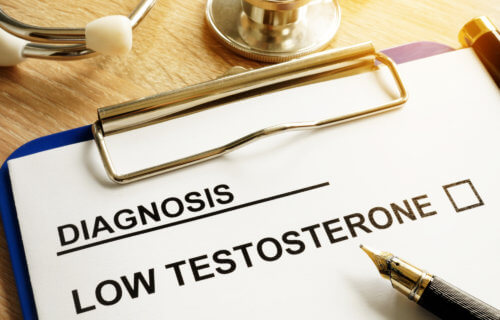CHINA — There’s no shortage of reasons to stay away from junk food, but one study out of China is giving men in particular one more to add to the list. Doctors say that eating foods which cause inflammation — such as processed carbs and sugar, as well as polyunsaturated fats — may raise the risk of low testosterone in men.
Testosterone deficiency occurs when levels fall below 300 ng/dL (nanograms per deciliter) in men. It’s estimated that anywhere from 20 to 50 percent of American man have low levels of the hormone, which regulates sperm production and sex drive. A low libido, reduced energy, impaired focus, and depression are all associated with decreased levels of testosterone. A lack of testosterone has also been linked to chronic illnesses such as heart disease and, even, obesity.
Researchers say that obese men who eat a diet filled with pro-inflammatory foods are at the highest risk of low testosterone.
“Our results suggest men who eat a pro-inflammatory diet, particularly those who are obese, are more likely to have testosterone deficiency,” say Drs. Qiu Shi and Zhang Chichen, colleagues at West China Hospital of Sichuan University, in a statement. “Since men with obesity likely already experience chronic inflammation, physicians should be aware of contributing factors, like diet, that could likely worsen this inflammation and contribute to the risk of other health conditions, such as diabetes and heart disease.”
In animal and human research, testosterone deficiency has been related to higher levels of inflammation throughout the body. Men, in particular, who suffer from low testosterone have greater amounts of pro-inflammatory cytokines, which are tiny proteins produced by cells when reacting to damage, illness, or inflammatory stimuli in the environment. A scale known as the diet inflammatory index (DII) was developed as a method for analyzing how food impacts one’s risk of inflammation, particularly in connection to other health indicators.
The research team investigated the relationship between the DII and testosterone deficiency in 4,151 males from the National Health and Nutrition Examination Survey. All men submitted a 24-hour nutritional questionnaire and were tested for sex hormones. The DII of each participant was estimated according to the food history questionnaire. In all, approximately 26 percent of the males were testosterone deficient.
The risk of low testosterone were nearly 30 percent greater in men who ate the most pro-inflammatory diet than in those who ate foods less likely to cause inflammation. After controlling for other factors such as BMI and smoking, the correlations remained substantial. Obese men who scored high on the DII were 60 percent more likely to have low testosterone compared to those who scored lower.
The authors point out certain significant limitations of their work, such as the fact that the DII was computed using a restricted quantity of anti-inflammatory and pro-inflammatory dietary factors. “While these findings do not prove causation, they do support previous research suggesting a pro-inflammatory diet can contribute to testosterone deficiency, among other potentially debilitating health issues,” they say.
Further research is needed to confirm the causal connection between DII and testosterone insufficiency. They add that eating a less pro-inflammatory diet “could be a feasible method to reduce the accumulated inflammatory burden, [potentially] leading to an increased testosterone level.”
This study is published in The Journal of Urology.
